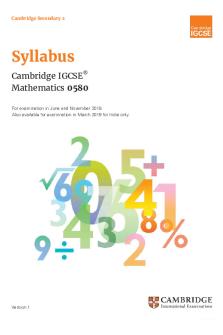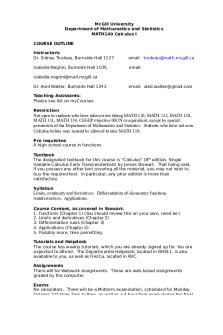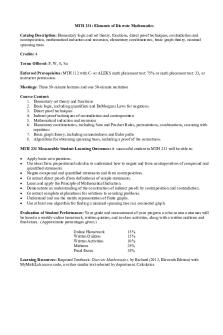MATH 240 SYLLABUS PDF

| Title | MATH 240 SYLLABUS |
|---|---|
| Author | Wenlong Shao |
| Course | Discrete Structures 1 |
| Institution | McGill University |
| Pages | 2 |
| File Size | 61.7 KB |
| File Type | |
| Total Downloads | 61 |
| Total Views | 145 |
Summary
Syllabus...
Description
MATH 240 – Discrete Structures I Winter 2019, McGill University Instructor.
Dr. Jeremy Macdonald Office: Burnside Hall 1132 Office hours: TBA Tel.: 514-398-3846 email: [email protected]
Course topics. Introduction to discrete mathematics and applications. Logical reasoning and methods of proof. Elementary number theory and cryptography: prime numbers, modular equations, RSA encryption. Combinatorics: basic enumeration, combinatorial methods, recurrence equations. Graph theory: trees, cycles, planar graphs. Lectures. The course lectures constitute the primary source of course material. Reference texts. The textbooks below will be used as secondary sources of course material. A list of relevant textbook sections will be provided on the course website. • Discrete Mathematics: Elementary and Beyond, by L. Lov´ asz, J. Pelik´ an, and K. Vesztergombi. • Book of Proof, by Richard Hammack. Freely available in PDF at http://www.people.vcu.edu/~rhammack/BookOfProof/ Tutorial. There is one tutorial each week, taught by a teaching assistant. The purpose of the tutorial is to see more examples, at a slower pace than during the lecture. You are strongly encouraged to ask questions during the tutorial. There are two scheduled times, you may attend either of them. Registration is not required. The material covered at each time will be similar. Evaluation. Your final grade will be calculated as shown below. Written assignments WeBWorK assignments Midterm exam Final exam
10% 5% 20% 65%
Written assignments. There will be four written homework assignments, which will focus on learning to write proofs. Your proofs must be written clearly using precise mathematical language. A portion of the marks on each assignment will be allocated to the quality of your expression. You are encouraged to use the LATEX typesetting system to prepare your assignments. Information about using LATEX is available on the course website. Most mathematical texts1 are now written using this system, so it is a valuable skill to learn. WeBWorK assignments. There will be several assignments given via the online system WeBWorK. These assignments will focus on computational problems. You can access WeBWorK for this course using the URL below. http://msr02.math.mcgill.ca/webwork2/MATH240 WINTER2019/ Your username and password are both set to your McGill student ID by default. Please change your password after logging in the first time. For any login problems, please email . For all other problems, please email the instructor. Assignment submission. WeBWorK assignments are distributed and submitted via WeBWorK, and written assignments are distributed and submitted via myCourses. Paper submissions of written assignments are not accepted. Handwritten assignments are acceptable; please ensure that you provide a clear scan of 1 It’s
not just for mathematical texts. This document was produced using LATEX.
your assignment. Photocopy machines on campus can be used for scanning. Students are responsible for being aware of the due date for all assignments. Late assignments are not accepted. Requests for brief extensions will be considered on an individual basis, provided the request is made a reasonable time before the due date. Homework policy. You are allowed (in fact encouraged) to discuss the homework with other students, and you may consult books, websites, etc. you wish. However, you must write up your own solution, as you will be assesed on the quality of your mathematical writing as well as the logical correctness of your proofs. Direct copying from any sources is not permitted. If you ask for help on internet forums, you are expected to state that your question relates to an assigned homework problem. Midterm exam. There will be one midterm exam. The date will be announced on the course website. Final exam. There will be a final exam, scheduled during the final exam period. The final exam will cover material from the entire course. Academic Integrity. McGill University values academic integrity. Therefore, all students must understand the meaning and consequences of cheating, plagiarism and other academic offences under the Code of Student Conduct and Disciplinary Procedures (see www.mcgill.ca/students/srr/honest/ for more information). Language. In accord with McGill University’s Charter of Students Rights, students in this course have the right to submit in English or in French any written work that is to be graded. Disclaimer. In the event of extraordinary circumstances beyond the University’s control, the content and/or evaluation scheme in this course is subject to change....
Similar Free PDFs

MATH 240 SYLLABUS
- 2 Pages

Discussion 1 Math 240
- 2 Pages

Math syllabus
- 40 Pages

CS 240 Syllabus FA2021 630
- 3 Pages

PSY 240 Fall 2019 Syllabus
- 4 Pages

BMSC 240 Syllabus Winter 2020
- 4 Pages

Math 171 Syllabus - syll
- 3 Pages

Math Standard Syllabus
- 96 Pages

Syllabus MATH 140
- 2 Pages

Math 111 F21 - Syllabus
- 7 Pages

MATH 165 Syllabus
- 9 Pages

Math gre w2015 syllabus
- 2 Pages

Syllabus Math 221
- 4 Pages

Math 114 Course Syllabus
- 9 Pages

Discrete math syllabus
- 2 Pages

Math+10+Horizontal+Syllabus
- 4 Pages
Popular Institutions
- Tinajero National High School - Annex
- Politeknik Caltex Riau
- Yokohama City University
- SGT University
- University of Al-Qadisiyah
- Divine Word College of Vigan
- Techniek College Rotterdam
- Universidade de Santiago
- Universiti Teknologi MARA Cawangan Johor Kampus Pasir Gudang
- Poltekkes Kemenkes Yogyakarta
- Baguio City National High School
- Colegio san marcos
- preparatoria uno
- Centro de Bachillerato Tecnológico Industrial y de Servicios No. 107
- Dalian Maritime University
- Quang Trung Secondary School
- Colegio Tecnológico en Informática
- Corporación Regional de Educación Superior
- Grupo CEDVA
- Dar Al Uloom University
- Centro de Estudios Preuniversitarios de la Universidad Nacional de Ingeniería
- 上智大学
- Aakash International School, Nuna Majara
- San Felipe Neri Catholic School
- Kang Chiao International School - New Taipei City
- Misamis Occidental National High School
- Institución Educativa Escuela Normal Juan Ladrilleros
- Kolehiyo ng Pantukan
- Batanes State College
- Instituto Continental
- Sekolah Menengah Kejuruan Kesehatan Kaltara (Tarakan)
- Colegio de La Inmaculada Concepcion - Cebu